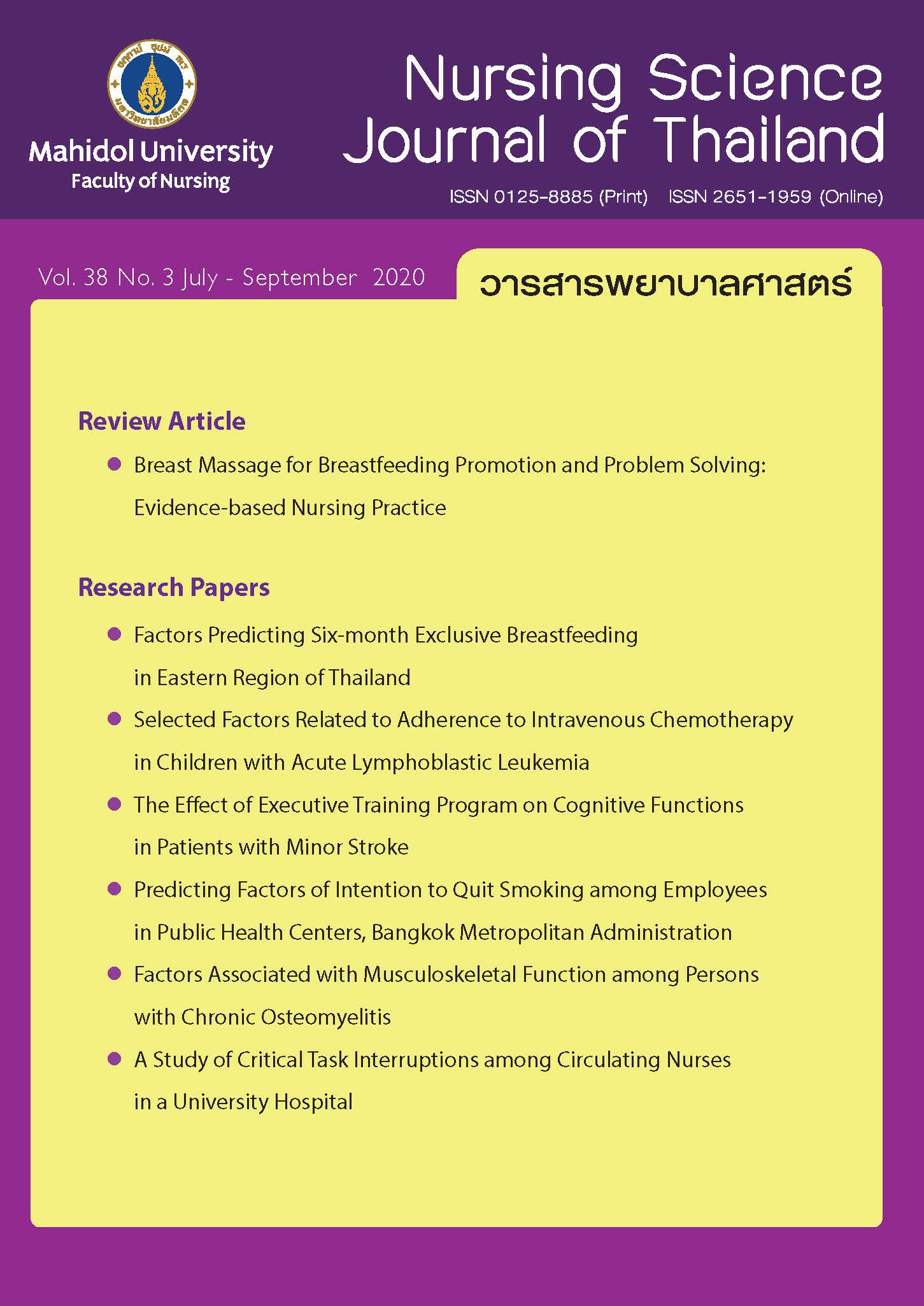Selected Factors Related to Adherence to Intravenous Chemotherapy in Children with Acute Lymphoblastic Leukemia
Main Article Content
Abstract
Purpose: This study was aimed at studying the correlation between perception of consequences of illness, perception of control/cure, adverse drug reaction from chemotherapy, duration of treatment with chemotherapy, communication between nurses and caregivers and adherence to treatment protocol of children with acute lymphoblastic leukemia (ALL).
Design: A correlational study.
Methods: The subjects consisted of 93 pairs of caregivers and children with ALL aged 1-15 years who were treated with chemotherapy at two tertiary hospitals. Data were collected by using the demographic data questionnaire, the communication between nurses and caregivers questionnaire, the revised illness perception questionnaire, the medical record form for adherence to treatment protocol and adverse drug reactions. Data were analyzed by using descriptive statistics, Chi-square, and Fisher’s exact test.
Main findings: The findings revealed that 74.19% of children with ALL adhered to treatment protocol. Duration of treatments and communication between nurses and caregivers were correlated with adherence to treatment protocol with statistical significance (c2 = 15.559, p < .001 and 7.717, p < .01, respectively). Adverse drug reaction was correlated with adherence to treatment protocol (p < .001). Perception of consequences of illness and perception of control/cure of caregivers were not correlated with adherence to treatment protocol (c2 = 1.904, p >.05 and .009, p > .05, respectively).
Conclusion and recommendations: Adverse drug reaction, duration of treatments and communication between nurses and caregivers were correlated with adherence to treatment protocol with statistical significance. Therefore, healthcare personnel should develop guidelines for managing adverse drug reaction from chemotherapy and improve effective communication with caregivers to promote adherence to treatment protocol of children with ALL.
Article Details
Copyright Notice: Nursing Science Journal of Thailand has exclusive rights to publish and distribute the manuscript and all contents therein. Without the journal’s permission, the dissemination of the manuscript in another journal or online, and the reproduction of the manuscript for non-educational purpose are prohibited.

Disclaimer: The opinion expressed and figures provided in this journal, NSJT, are the sole responsibility of the authors. The editorial board bears no responsibility in this regard.
References
Siripul P. Nursing care for adverse drug reaction management. In: Nursing care for pediatric patients with leukemia. Khon Kaen: Khon Kaen University Printing; 2011. p.3-33. (in Thai).
Siriboonpipattana P. Pediatric nursing: pediatric nursing at there are medical disorders in various systems. Nonthaburi: Tana Press. 2012. 570 p. (in Thai).
Sthapornnanon N. Medication non adherence. Thai Bulletin of Pharmaceutical Sciences. 2012;7(1):1-17. doi: 10.14456/tbps.2012.2. (in Thai).
Taha A, Vinograd I, Sakhnini A, Eliakim-Raz N, Farbman L, Baslo R, et al. The association between infection and chemotherapy interruptions among cancer patients: prospective cohort study. J Infect. 2015;70(3):223-9. doi: 10.1016/j.jinf.2014.10.008.
Ward E, DeSantis C, Robbins A, Kohler B, Jamal A. Childhood and adolescent cancer statistics, 2014. CA Cancer J Clin. 2014;64(2):83-103. doi: 10.3322/caac.21219.
Seal B, Asche CV, Shermock KM, Anderson S, Camaron J. Adherence rates for intravenous chemotherapy regimens to treat colon cancer. Value Health. 2013;16(7):A418. doi: 10.1016/j.jval.2013.08.548.
Landier W. Predictors of non–adherence to oral chemotherapy in children with acute lymphoblastic leukemia [dissertation]. Manoa: University of Hawaii at Manoa; 2010. 230 p.
The Thai Society of Hematology. National protocol for the treatment of children cancers 2016. Bangkok: M Print Corporation. 2016. 330 p. (in Thai).
Sriputtho N, Charoenrakpakdee P, Sukkongwaree A. The incidence of chemotherapy induced febrile neutropenia in children with acute lymphocytic leukemia patient at Queens Sirikit National Institute of Child Health [Internet]. Bangkok: Queens Sirikit National Institute of Child Health; 2010 [cited 2020 May 20]. Available from: http://dlibrary.childrenhospital.go.th/handle/6623548333/116. (in Thai).
Sonkongdang W, Kamtawang S, Niyomkar S. Factors influencing caregivers’ behaviors regarding nutritional care for preventing infection in leukemic children with chemotherapy induced neutropenia. Nursing Journal. 2015;42(Special issue):12-31. (in Thai).
Wells JS, Strickland OL, Dalton JA, Freeman S. Adherence to intravenous chemotherapy in African-American and Caucasian women with early stage breast cancer. Cancer Nurs. 2015;38(2):89-98. doi: 10.1097/NCC.0000000000000139.
Lamchang S, Suklerttrakul T, Junpunyaskool O, Lamchang P. Perception of illness among caregivers of children with acute illness and related factors. Nursing Journal. 2018;45(1):75-86. (in Thai).
Jacob Arriola KR, Mason TA, Bannon KA, Holmes C, Powell CL, Horne K, et al. Modifiable risk factors for adherence to adjuvant endocrine therapy among breast cancer patients. Patient Educ Couns. 2014;95(1):98-103. doi: 10.1016/j.pec.2013.12.019.
World Health Organization. Adherence to long-term therapies: evidence for action / (edited by Eduardo Sabaté) [internet]. Geneva, World Health Organization; 2003 [cited 2016 May 3]. Available from: https://apps.who.int/iris/handle/10665/42682.
Moss-Morris R, Weinman J, Petrie K, Horne R, Cameron L, Buick D. The revised Illness Perception Questionnaire (IPQ-R). Journal Psychology and Health. 2002;17(1):1-16. doi: 10.1080/08870440290001494.
Landier W. Adherence to oral chemotherapy in childhood acute lymphoblastic leukemia: an evolutionary concept analysis. Oncol Nurs Forum. 2011;38(3):343-52. doi: 10.1188/11.ONF.343-352.
Kumar J, Gudhoor M, Ganachari MS. Parallel assessment of chemotherapy adherence and supportive therapy adherence on occurrence and minimization of adverse drug reactions among cancer patients: a clinical-based observational study. J Pharm Technol. 2020;36(2):72-7. doi: 10.1177/8755122520901739.
Jacobs MJ, Pensak NA, Sporn NJ, MacDonald JJ, Lennes IT, Safren SA, et al. Treatment satisfaction and adherence to oral chemotherapy in patients with cancer. J Onco Pract. 2017;13(5):e474-85. doi: 10.1200/JOP.2016.019729.
Lea CS, Bohra S, Moore T, Passwater C, Liles D. Exploring behaviors, treatment beliefs, and barriers to oral chemotherapy adherence among adult leukemia patients in rural outpatient setting. BMC Res Notes. 2018;11(1):843. doi: 10.1186/s13104-018-3935-z.
Lin C, Clark R, Tu P, Bosworth HB, Zullig LL. Breast cancer oral anti-cancer medication adherence: a systematic review of psychosocial motivators and barriers. Breast Cancer Res Treat. 2017;165(2):247-260. doi: 10.1007/s10549-017-4317-2.
Szentes A, Kokonyei G, Bekesi A, Bokretas I, Torok S. Differences in illness perception between children with cancer and other chronic diseases and their parents. Clin Child Psychol Psychiatry. 2018;23(3):365-80. doi: 10.1177/1359104517731899.
Rust C, Davis C. Health literacy and medication adherence in underserved African– American breast cancer survivors: a qualitative study. Soc Work Health Care. 2011;50(9):739-61. doi: 10.1080/00981389.2011.585703.


